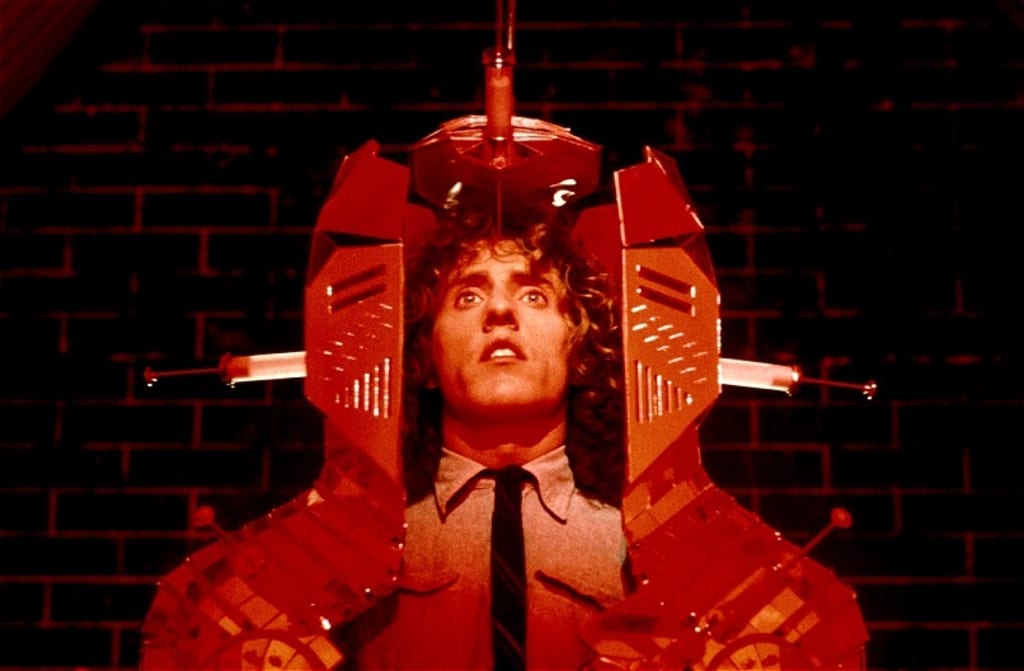Sure Plays Mean Pinball
Tommy (1975)

I've seen the Who's rock opera Tommy, directed outlandishly and lavishly by Ken Russell, so many times the movie is permanently recorded in my subconscious. Be that as it may, yesterday I rewatched it at four in the morning and was surprised that it didn't honk off the neighbors. You want to avoid that, pinball wizard or not.
Visual metaphors and excess abound, and the movie opens with a setting sun (son?), in front of which, silhouetted is the image of Captain Walker (Robert Powell), Tommy's father (Tommy of course being the titular character here), who is hiking in the mountains with Nora, Tommy's mommy. They make love under a waterfall.
"Captain Walker didn't come home, his unborn child will never know him..." The lyrics to the opening rock song, following hot on the heels of an involved overture, remind us, and indeed we see the War Years in England, played out in a panorama of bombings, chorus girls with gas masks, Rosie the Riveters riveting, and a scene where Ann-Margret pulls a tray of the ubiquitous little silver "pinballs" over onto herself. Moments such as these, bits of violence, excess, and shock thrown at the viewer amid the caterwaul of cartoonish psychedelia and operatic pomp, are what make for an unsettling cinematic blend.
The songs tell us the story of the album and are sung in a histrionic manner by Ann-Margret, Oliver Reed, and the other players. Tommy, learning the secret of what really happened to his father (who was presumably shot down in the war), retreats within himself, becoming "deaf, dumb, and blind", and living in a child's world of fantasy and play, but one that is entirely internal.
As a grown man, still locked in his dark, soundless, and incommunicative prison (a metaphor for the spiritual darkness, the struggle within that binds everyone in the world, in which all seem to seek their escape), Tommy's mother Nora takes him to a weird, Marilyn Monroe worshipping cult presided over by Eric Clapton. His "Uncle" (played as a salacious grotesque by Oliver Reed) takes him to "Acid Queen" Tina Turner. His cousin Kevin (Paul Nicholas), a sadistic punk, and "Uncle Ernie" (the doomed Keith Moon) both abuse and molest him. An inner vision while standing by the mirror leads him to discover a pinball machine. And he is halfway toward becoming the "New Messiah."
Indeed, in the film Tommy, the concept seems rooted in the parodic send-up of the Messiah Myth behind organized religion, shown here first as adulation of a "pinball wizard"; i.e. someone extraordinary at one of the dumbest and most pointless arcade games imaginable. It takes virtually no talent or skill to play pinball, but, like life, deaf, dumb, and blind or not, one can only keep the ball afloat across the table and slamming into the bumpers for so long. Tommy has a "higher path" to follow, and regaining his sight, Roger Daltrey leaps onto the planetary scene already being a celebrity. He hang glides over warring bikers, white English "Soul Boys" with amazing sideburns and coiffed hair, singing. "Can you see me coming? A new vibration. From afar you'll see me --I'M A SENSATION!" Daltry sings a New Gospel of being rescued from his "blindness" by ineffable forces and having a "message" to convey to the world.
Listening to You
Nora writhes in fecal beans and grinds against a huge, phallus-shaped pillow, while ensconced in a surreally pristine and clinically white boudoir. (The beans are shat, after a cascade of bubbles, from a broken television screen.) Jack Nicholson puts in a singing cameo as a concerned doctor, and Nora and Tommy's Uncle transform into weird, uniform-wearing cult leaders managing the "business" of Tommy's new religion. We have brief musical numbers, such as the story of Sally Simpson; playful, playful child-like excess thrown at the viewer as a diversion. On the whole, though, the film suddenly takes a more serious look at the commercialization of spirituality and the resultant phony self-aggrandizement and manipulation that result from blindly (in this case literally) following the "Chosen One."
Tommy's followers get violently fed up waiting for salvation. In the end, he escapes the nightmare of blood and fire and violence, and the end of the movie seems like an inversion of the beginning. The final song, one of the best from the film, underscores the message both of seeking redemption in a false teacher and, paradoxically finding salvation by taking Kierkegard's "leap of faith" against the existential meaninglessness of existence, the seeming doom opening up and waiting to swallow us; the hungry mouth of the Eternal Void.
"Listening to you, I get the music, gazing at you, I get the heat. Following You, I climb the mountain, I get excitement at your feet!"
Daltrey ascends, the sun rising behind him, the ubiquitous and mysterious, god-like image mirrored in the shape of the pinball (round, Alpha, and Omega; no beginning no end). The light of illumination has gone over him, and now finito. The inner journey never ends; God is taking care of things.
Russell's film is a visual and auditory odyssey from a bygone age, one with a critical subtext of phony miracles, blind obedience, and the constant search for a truth that might be every bit, finally, as pointless and transitory as a game of pinball. Along the cinematic way, we have numerous cameos from Pete Townshend, John Entwistle, and others, as well as Russel's distinctive, grandiose style of carnivalesque, over-the-topness, and satire of commercialized pop cultural and television references. For those that only know Tommy from its toothless incarnation as a Broadway musical number, a bourgeois piece of pap offered up as a "flavor-of-the-month" retread, the scope of this film, its occasional "teeth," may come as a bit of a surprise. (And if you like the music anyway, you'll hardly be disappointed.)
Tilt.
***
Note: According to ChatGPT, this review, "Effectively captures the essence of Tommy, making it an engaging read for anyone interested in the film or its themes. Well done!"
(I tell ya, those robots, they love me.)
Trailer
About the Creator
Tom Baker
Author of Haunted Indianapolis, Indiana Ghost Folklore, Midwest Maniacs, Midwest UFOs and Beyond, Scary Urban Legends, 50 Famous Fables and Folk Tales, and Notorious Crimes of the Upper Midwest.: http://tombakerbooks.weebly.com
Enjoyed the story? Support the Creator.
Subscribe for free to receive all their stories in your feed. You could also pledge your support or give them a one-off tip, letting them know you appreciate their work.







Comments (6)
I loved the film, which was really a full length pop video , som amazing spots in there
Great tribute! That song sure does stick, doesn't it? Congrats on the top story
I love this song!
I prefer the album. Russell missed a huge opportunity to just tell it straight without the whole over-the-top visuals and fragmented storytelling. Although I loved Elton in those platforms, Turner's burning performance as the Acid Queen, and Keith being...Keith. Thank you for this...
Excellent review of an iconic film/musical from my youth. (Sometimes ChatGPT gets it right, lol.)
This was an awesome Rock Opera. And you gave it a great tribute. For the record I actually prefer Elton johns version of Pinball wizard than the Who.